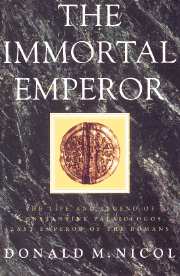Book contents
5 - THE DEATH OF CONSTANTINE
Published online by Cambridge University Press: 28 October 2009
Summary
The fall of Constantinople and the death of its Emperor were very soon interpreted as the fulfilment of prophecies of one kind or another. The monk Gennadios, who had caused the Emperor so much trouble, and whose name was not mentioned in dispatches during the defence of the city, was taken prisoner with his fellow monks and sold into slavery by the Turks. The Sultan Mehmed was well briefed about the religious dissension among the now defeated Orthodox Christians. He knew that many of them openly attributed their defeat to the union of Florence; and he knew that the unionist Patriarch Gregory III had abandoned if he had not forfeited his office. In his capacity as successor to the Christian Roman Emperor in Constantinople the Sultan felt bound to appoint a new Patriarch, who would be answerable to him for the conduct of all Christians in his dominions. His choice fell on George Scholarios, the monk Gennadios. He was generally respected by the Orthodox and particularly acceptable to the Sultan as one would could be relied upon to denounce any moves that the western Christians might make to upset the course of history. A search was made and Gennadios was found and brought to Constantinople where the Sultan invested him as Patriarch with all the traditional ceremony proper to the occasion, in January 1454.
Gennadios left no detailed account of the Turkish conquest of his city and the death of its Emperor Constantine. But he compiled a series of chronological observations on the ways in which the hand of providence could be seen to have influenced the dreadful events of his lifetime.
- Type
- Chapter
- Information
- The Immortal EmperorThe Life and Legend of Constantine Palaiologos, Last Emperor of the Romans, pp. 74 - 94Publisher: Cambridge University PressPrint publication year: 1992



